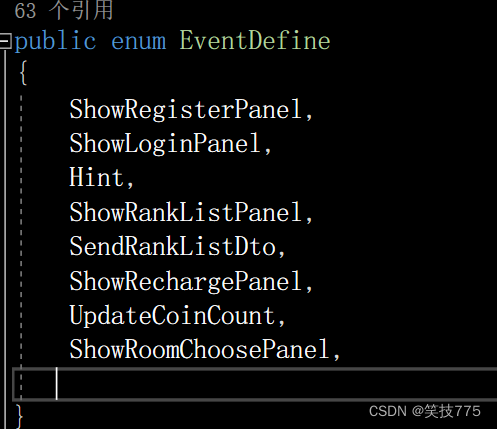1.原理:使用委托,事件的监听与广播调用一个委托
2.如何使用事件的广播与监听系统
CallBack类:定义委托的类,定义的委托分别为无参的,一个参数,两个参数,三个参数,四个参数,五个参数的类。这个类相当于c#提供的Action类
public delegate void CallBack();
public delegate void CallBack<T>(T arg);
public delegate void CallBack<T, X>(T arg1, X arg2);
public delegate void CallBack<T, X, Y>(T arg1, X arg2, Y arg3);
public delegate void CallBack<T, X, Y, Z>(T arg1, X arg2, Y arg3, Z arg4);
public delegate void CallBack<T, X, Y, Z, W>(T arg1, X arg2, Y arg3, Z arg4, W arg5);EventDefine类:存放事件码的一个类,他是一个枚举类型。根据实际的开发需求来添加自定义事件码

EventCenter类:处理不同参数事件的监听,移除监听和广播。
public class EventCenter
{
private static Dictionary<EventDefine, Delegate> m_EventTable = new Dictionary<EventDefine, Delegate>();
private static void OnListenerAdding(EventDefine eventType, Delegate callBack)
{
if (!m_EventTable.ContainsKey(eventType))
{
m_EventTable.Add(eventType, null);
}
Delegate d = m_EventTable[eventType];
if (d != null && d.GetType() != callBack.GetType())
{
throw new Exception(string.Format("尝试为事件{0}添加不同类型的委托,当前事件所对应的委托是{1},要添加的委托类型为{2}", eventType, d.GetType(), callBack.GetType()));
}
}
private static void OnListenerRemoving(EventDefine eventType, Delegate callBack)
{
if (m_EventTable.ContainsKey(eventType))
{
Delegate d = m_EventTable[eventType];
if (d == null)
{
throw new Exception(string.Format("移除监听错误:事件{0}没有对应的委托", eventType));
}
else if (d.GetType() != callBack.GetType())
{
throw new Exception(string.Format("移除监听错误:尝试为事件{0}移除不同类型的委托,当前委托类型为{1},要移除的委托类型为{2}", eventType, d.GetType(), callBack.GetType()));
}
}
else
{
throw new Exception(string.Format("移除监听错误:没有事件码{0}", eventType));
}
}
private static void OnListenerRemoved(EventDefine eventType)
{
if (m_EventTable[eventType] == null)
{
m_EventTable.Remove(eventType);
}
}
//no parameters
public static void AddListener(EventDefine eventType, CallBack callBack)
{
OnListenerAdding(eventType, callBack);
m_EventTable[eventType] = (CallBack)m_EventTable[eventType] + callBack;
}
//Single parameters
public static void AddListener<T>(EventDefine eventType, CallBack<T> callBack)
{
OnListenerAdding(eventType, callBack);
m_EventTable[eventType] = (CallBack<T>)m_EventTable[eventType] + callBack;
}
//two parameters
public static void AddListener<T, X>(EventDefine eventType, CallBack<T, X> callBack)
{
OnListenerAdding(eventType, callBack);
m_EventTable[eventType] = (CallBack<T, X>)m_EventTable[eventType] + callBack;
}
//three parameters
public static void AddListener<T, X, Y>(EventDefine eventType, CallBack<T, X, Y> callBack)
{
OnListenerAdding(eventType, callBack);
m_EventTable[eventType] = (CallBack<T, X, Y>)m_EventTable[eventType] + callBack;
}
//four parameters
public static void AddListener<T, X, Y, Z>(EventDefine eventType, CallBack<T, X, Y, Z> callBack)
{
OnListenerAdding(eventType, callBack);
m_EventTable[eventType] = (CallBack<T, X, Y, Z>)m_EventTable[eventType] + callBack;
}
//five parameters
public static void AddListener<T, X, Y, Z, W>(EventDefine eventType, CallBack<T, X, Y, Z, W> callBack)
{
OnListenerAdding(eventType, callBack);
m_EventTable[eventType] = (CallBack<T, X, Y, Z, W>)m_EventTable[eventType] + callBack;
}
//no parameters
public static void RemoveListener(EventDefine eventType, CallBack callBack)
{
OnListenerRemoving(eventType, callBack);
m_EventTable[eventType] = (CallBack)m_EventTable[eventType] - callBack;
OnListenerRemoved(eventType);
}
//single parameters
public static void RemoveListener<T>(EventDefine eventType, CallBack<T> callBack)
{
OnListenerRemoving(eventType, callBack);
m_EventTable[eventType] = (CallBack<T>)m_EventTable[eventType] - callBack;
OnListenerRemoved(eventType);
}
//two parameters
public static void RemoveListener<T, X>(EventDefine eventType, CallBack<T, X> callBack)
{
OnListenerRemoving(eventType, callBack);
m_EventTable[eventType] = (CallBack<T, X>)m_EventTable[eventType] - callBack;
OnListenerRemoved(eventType);
}
//three parameters
public static void RemoveListener<T, X, Y>(EventDefine eventType, CallBack<T, X, Y> callBack)
{
OnListenerRemoving(eventType, callBack);
m_EventTable[eventType] = (CallBack<T, X, Y>)m_EventTable[eventType] - callBack;
OnListenerRemoved(eventType);
}
//four parameters
public static void RemoveListener<T, X, Y, Z>(EventDefine eventType, CallBack<T, X, Y, Z> callBack)
{
OnListenerRemoving(eventType, callBack);
m_EventTable[eventType] = (CallBack<T, X, Y, Z>)m_EventTable[eventType] - callBack;
OnListenerRemoved(eventType);
}
//five parameters
public static void RemoveListener<T, X, Y, Z, W>(EventDefine eventType, CallBack<T, X, Y, Z, W> callBack)
{
OnListenerRemoving(eventType, callBack);
m_EventTable[eventType] = (CallBack<T, X, Y, Z, W>)m_EventTable[eventType] - callBack;
OnListenerRemoved(eventType);
}
//no parameters
public static void Broadcast(EventDefine eventType)
{
Delegate d;
if (m_EventTable.TryGetValue(eventType, out d))
{
CallBack callBack = d as CallBack;
if (callBack != null)
{
callBack();
}
else
{
throw new Exception(string.Format("广播事件错误:事件{0}对应委托具有不同的类型", eventType));
}
}
}
//single parameters
public static void Broadcast<T>(EventDefine eventType, T arg)
{
Delegate d;
if (m_EventTable.TryGetValue(eventType, out d))
{
CallBack<T> callBack = d as CallBack<T>;
if (callBack != null)
{
callBack(arg);
}
else
{
throw new Exception(string.Format("广播事件错误:事件{0}对应委托具有不同的类型", eventType));
}
}
}
//two parameters
public static void Broadcast<T, X>(EventDefine eventType, T arg1, X arg2)
{
Delegate d;
if (m_EventTable.TryGetValue(eventType, out d))
{
CallBack<T, X> callBack = d as CallBack<T, X>;
if (callBack != null)
{
callBack(arg1, arg2);
}
else
{
throw new Exception(string.Format("广播事件错误:事件{0}对应委托具有不同的类型", eventType));
}
}
}
//three parameters
public static void Broadcast<T, X, Y>(EventDefine eventType, T arg1, X arg2, Y arg3)
{
Delegate d;
if (m_EventTable.TryGetValue(eventType, out d))
{
CallBack<T, X, Y> callBack = d as CallBack<T, X, Y>;
if (callBack != null)
{
callBack(arg1, arg2, arg3);
}
else
{
throw new Exception(string.Format("广播事件错误:事件{0}对应委托具有不同的类型", eventType));
}
}
}
//four parameters
public static void Broadcast<T, X, Y, Z>(EventDefine eventType, T arg1, X arg2, Y arg3, Z arg4)
{
Delegate d;
if (m_EventTable.TryGetValue(eventType, out d))
{
CallBack<T, X, Y, Z> callBack = d as CallBack<T, X, Y, Z>;
if (callBack != null)
{
callBack(arg1, arg2, arg3, arg4);
}
else
{
throw new Exception(string.Format("广播事件错误:事件{0}对应委托具有不同的类型", eventType));
}
}
}
//five parameters
public static void Broadcast<T, X, Y, Z, W>(EventDefine eventType, T arg1, X arg2, Y arg3, Z arg4, W arg5)
{
Delegate d;
if (m_EventTable.TryGetValue(eventType, out d))
{
CallBack<T, X, Y, Z, W> callBack = d as CallBack<T, X, Y, Z, W>;
if (callBack != null)
{
callBack(arg1, arg2, arg3, arg4, arg5);
}
else
{
throw new Exception(string.Format("广播事件错误:事件{0}对应委托具有不同的类型", eventType));
}
}
}
} 具体使用的方法:首先要在Awkae或者Start方法中调用 EventCenter类中的AddListener方法添加监听,代码如下所示
EventDefine.ShowLoginPanel就是我们的事件码,Show就是要传递委托方法,如果方法有参数,要添加相对应类型的泛型,如下所示
要在OnDestroy方法中调用EventCenter类中的ReMoveListener方法移除监听,代码如下所示
注意:如果不对监听进行移除的话,后期会出现错误!!!
在其他类中使用UpdateCoinCount方法,只需要在这个类中广播EventDefine.UpdateCoinCount这个事件码就行了,代码如下所示:
下面举个例子来看看在实际开发中的使用,要实现点击注册按钮,在屏幕上提示注册结果,上代码
public float hintShowTime = 2f;
private Text hintText;
private Color color;
private void Awake()
{
EventCenter.AddListener<string>(EventDefine.Hint, Show);
hintText = GetComponent<Text>();
color = hintText.color;
}
private void OnDestroy()
{
EventCenter.RemoveListener<string>(EventDefine.Hint, Show);
}
private void Show(string text)
{
hintText.text = text;
hintText.DOColor(new Color(color.r, color.g, color.b, 1), 0.3f).OnComplete(() =>
{
StartCoroutine(Dealy());
});
}
IEnumerator Dealy()
{
yield return new WaitForSeconds(hintShowTime);
hintText.DOColor(new Color(color.r, color.g, color.b, 0), 0.3f);
}项目部分代码
private void Register_SRES(int value)
{
if (value == -1)
{
//事件广播,提示注册结果
EventCenter.Broadcast(EventDefine.Hint, "用户名已被注册");
return;
}
if (value == 0)
{
EventCenter.Broadcast(EventDefine.Hint, "注册成功");
}
}结果如下:

以上是我的学习内容的整理,这个系统总体来说比较简单,但解决了项目开发中的代码耦合性。